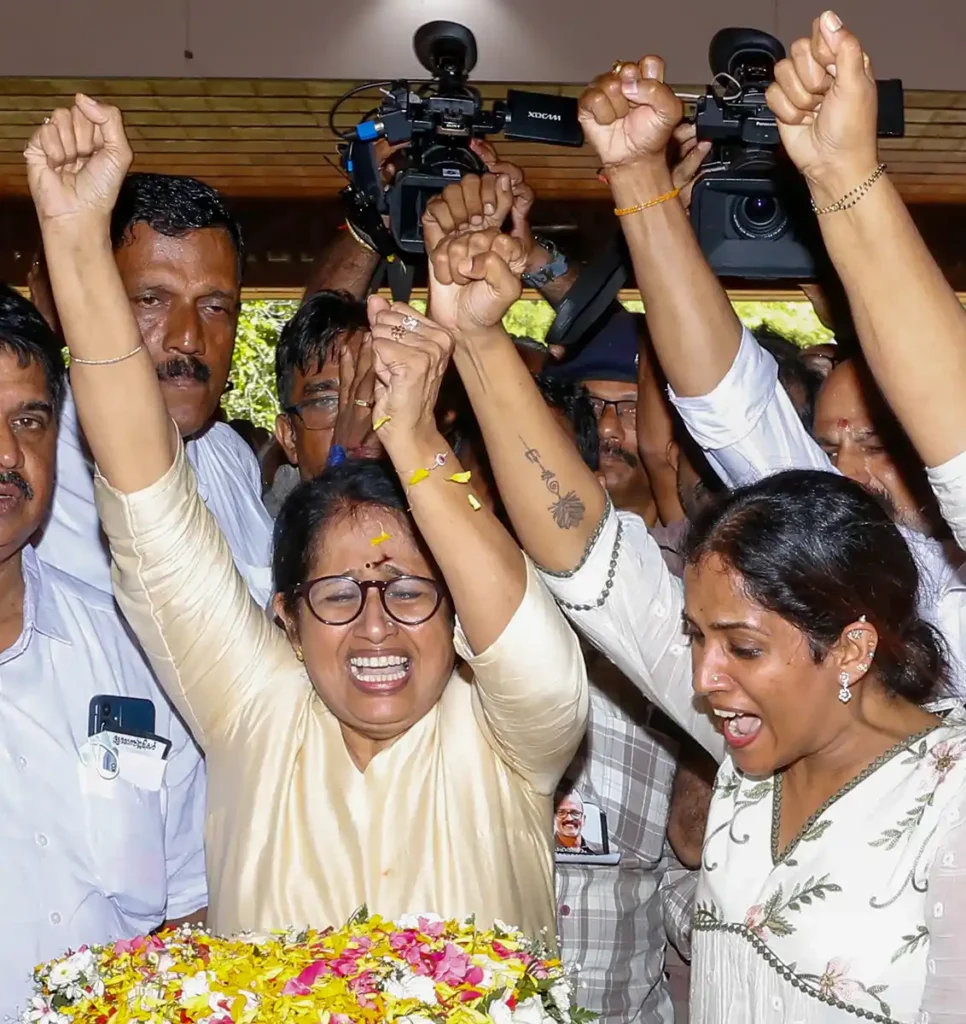
A Father’s Last Journey: Grief and Courage at Edappally
Hundreds gathered at Changampuzha Park in Kochi to bid a tearful farewell to N. Ramachandran, 65, an Edappally resident and Gulf expatriate, who lost his life in the recent Pahalgam terrorist attack. Travelling with his wife Sheela, daughter Aarati, and young grandchildren when the tragedy struck, Ramachandran became a target while the terrorists spared the women and children.
Sheela, recovering from a recent heart surgery, had stayed back in the car during the attack. She boarded her flight home unaware that her husband — no longer alive — was traveling in the same aircraft’s cargo hold. It was only upon reaching Kochi that the devastating truth was finally broken to her.
By early morning, Ramachandran’s body was placed for public homage at Changampuzha Park, a familiar spot where he had once been a quiet presence among the community. Sheela, despite her frailty, stood beside her husband, joined by her children and grandchildren, as streams of mourners filed past to pay their respects. Some offered flowers, others offered tears — and many simply reached out to console the grieving family in silence.
By 9 a.m., Minister P. Rajeev approached Sheela with a quiet word: the crowds were swelling, and a slight delay was inevitable. The family, composed and calm, simply nodded.
And then, as if drawn by some unseen force, Sheela and Aarati slowly approached the body once more.
What happened next stunned everyone.
Standing before the mortal remains of a husband and father, Sheela and Aarati raised their voices — not in sobs, but in something far fiercer. Three times, clear and strong, they cried out:
“Vande Mataram! Vande Mataram! Vande Mataram!”
“Ramachandran Amar Rahe!”
Their voices, filled with pride and pain, tore through the heavy morning air.
For a moment, the park froze.
The media crews, the bystanders, even seasoned politicians stood in stunned silence caught off guard by the raw, untamed eruption of patriotism at a civilian funeral.
Such scenes were once thought to belong only to the farewells of soldiers at distant borders daughters, wives, and sons saluting the fallen, their grief wrapped in the flag.
Yet here, in a quiet corner of Kerala, the same spirit soared — fierce, proud, and defiant against the cruelty of terror.
It was more than just slogans.
It was a statement of a changing Kerala, a changing India — where the pain of losing a loved one to senseless violence did not just shatter hearts but also stirred an unbreakable pride.
Where grief did not kneel — it stood tall and unyielding.
Later, as the crowds began to thin and the formalities resumed, the echoes of Sheela and Aarati’s cries lingered in the air — a reminder that Ramachandran had not fallen forgotten.
He had been saluted, not just by his family, but by the very soul of the community he had been part of.

:A Father’s Last Journey: Grief and Courage at Edappally
Hundreds gathered at Changampuzha Park in Kochi to bid a tearful farewell to N. Ramachandran, 65, an Edappally resident and Gulf expatriate, who lost his life in the recent Pahalgam terrorist attack. Travelling with his wife Sheela, daughter Aarati, and young grandchildren when the tragedy struck, Ramachandran became a target while the terrorists spared the women and children.
Sheela, recovering from a recent heart surgery, had stayed back in the car during the attack. She boarded her flight home unaware that her husband — no longer alive — was traveling in the same aircraft’s cargo hold. It was only upon reaching Kochi that the devastating truth was finally broken to her.
By early morning, Ramachandran’s body was placed for public homage at Changampuzha Park, a familiar spot where he had once been a quiet presence among the community. Sheela, despite her frailty, stood beside her husband, joined by her children and grandchildren, as streams of mourners filed past to pay their respects. Some offered flowers, others offered tears — and many simply reached out to console the grieving family in silence.
By 9 a.m., Minister P. Rajeev approached Sheela with a quiet word: the crowds were swelling, and a slight delay was inevitable. The family, composed and calm, simply nodded.
And then, as if drawn by some unseen force, Sheela and Aarati slowly approached the body once more.
What happened next stunned everyone.
Standing before the mortal remains of a husband and father, Sheela and Aarati raised their voices not in sobs, but in something far fiercer. Three times, clear and strong, they cried out:
“Vande Mataram! Vande Mataram! Vande Mataram!”
“Ramachandran Amar Rahe!”
Their voices, filled with pride and pain, tore through the heavy morning air.
For a moment, the park froze.
The media crews, the bystanders, even seasoned politicians stood in stunned silence caught off guard by the raw, untamed eruption of patriotism at a civilian funeral.
Such scenes were once thought to belong only to the farewells of soldiers at distant borders daughters, wives, and sons saluting the fallen, their grief wrapped in the flag.
Yet here, in a quiet corner of Kerala, the same spirit soared fierce, proud, and defiant against the cruelty of terror.
It was more than just slogans.
It was a statement of a changing Kerala, a changing India where the pain of losing a loved one to senseless violence did not just shatter hearts but also stirred an unbreakable pride.
Where grief did not kneel it stood tall and unyielding.
Later, as the crowds began to thin and the formalities resumed, the echoes of Sheela and Aarati’s cries lingered in the air a reminder that Ramachandran had not fallen forgotten.
He had been saluted, not just by his family, but by the very soul of the community he had been part of.
